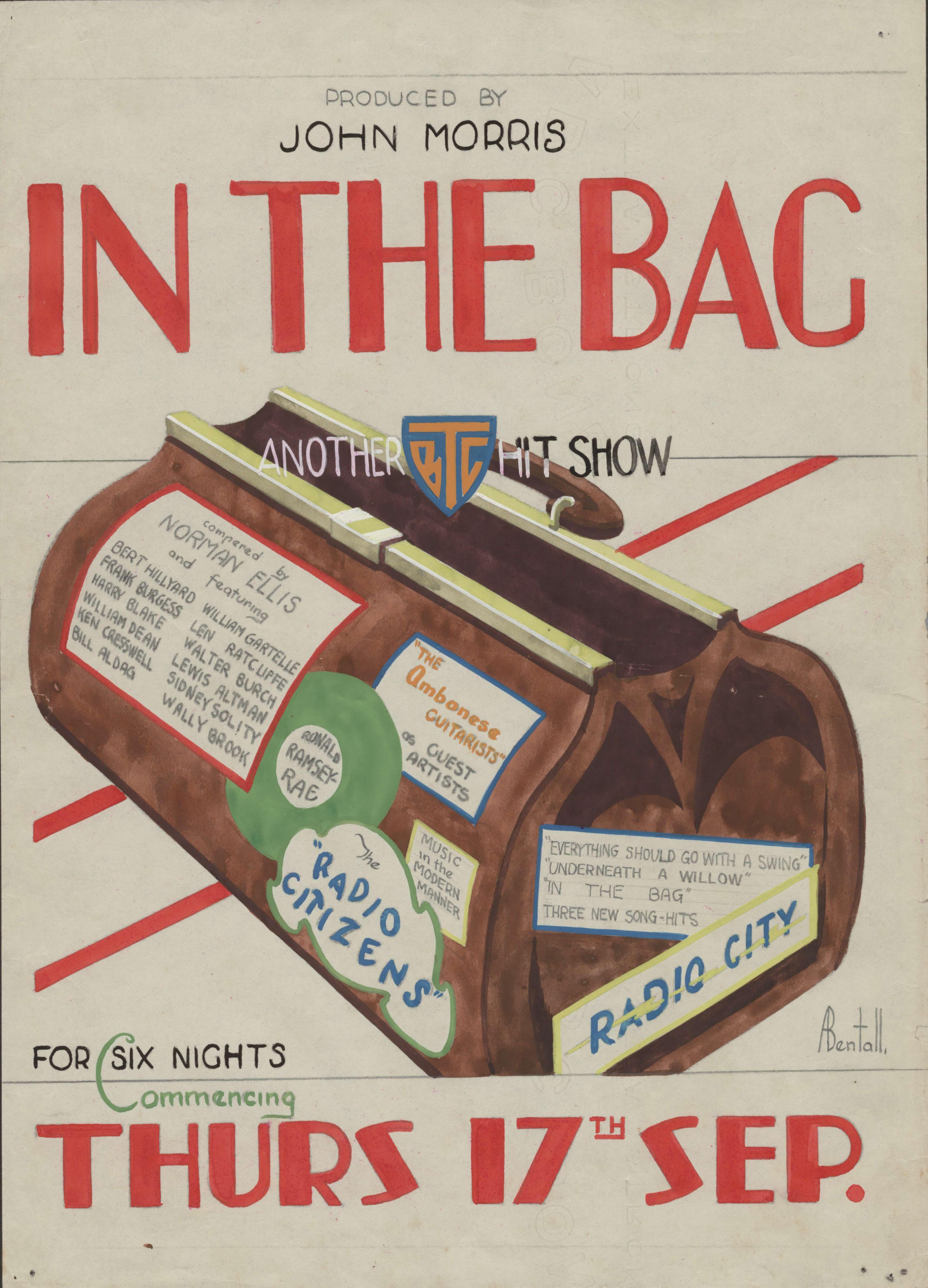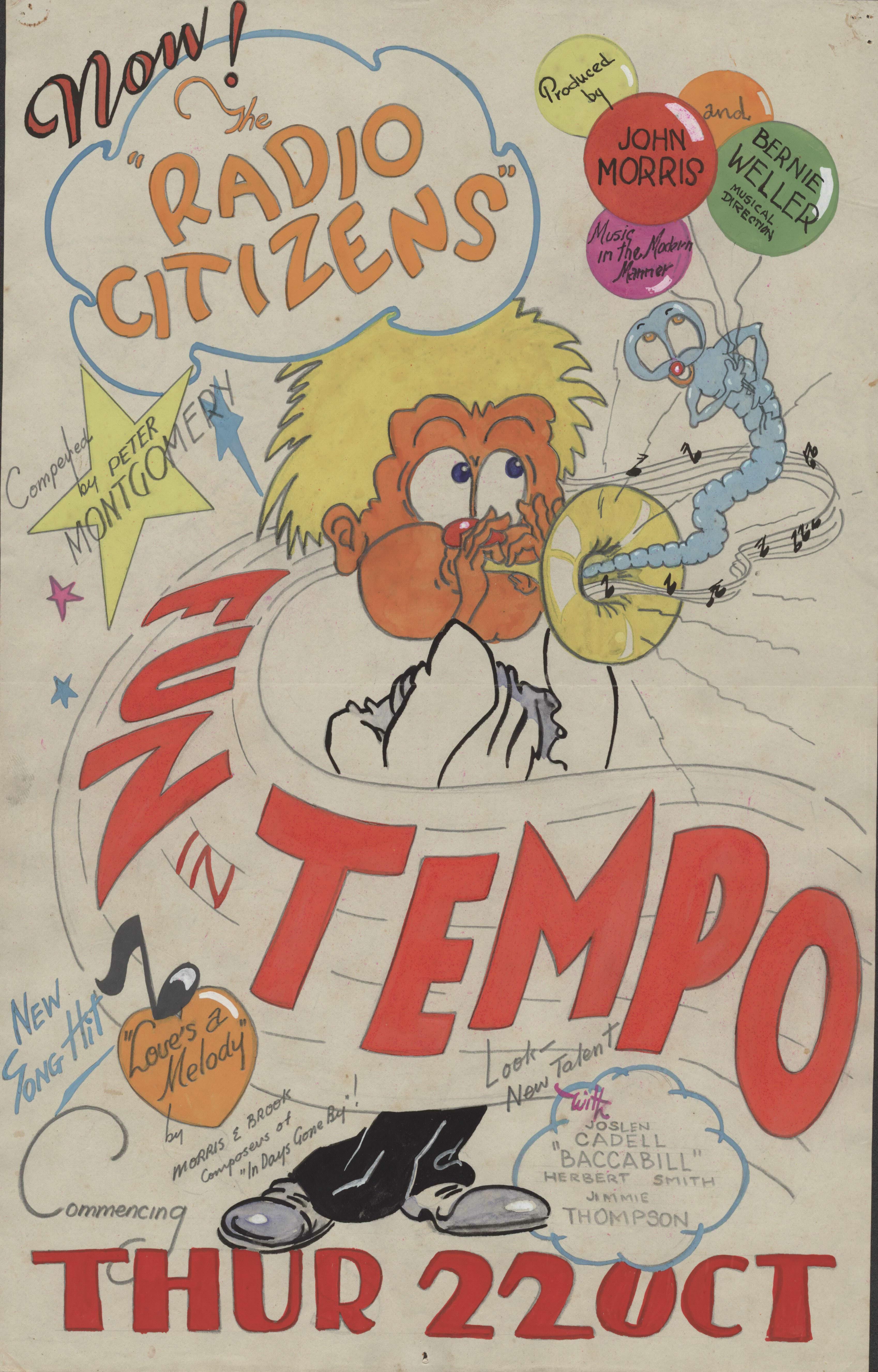It not only involved the prisoners in activities to take their minds off their incarceration, but also provided evening entertainment and boosted morale for others of a less musical bent. Some instruments were donated by the local community, and a few were purchased to enable the men at Bandoeng to form various ensembles. Several months after their capture, Lt Col Dunlop was able to report, ‘We have now quite a good selection of instruments and are developing a jazz band.’[1] And as we have seen, at Christmas a piano accompanied the prisoner’s carols.
The Radio Citizens, who put on shows at the camp’s theatre ‘Radio City’, were the resident camp orchestra. To avoid any confusion about their style and to promote an upbeat concert, their posters usually claimed they played ‘Music in The Modern Manner’. Major John de Crespigny was a fan from the outset and commented in his diary on 12 August 1942 that, ‘The new orchestra … is a Wow!!’ Less than two weeks later de Crespigny was again impressed.
‘Went to hear the Radio Citizens this evening. It was a first class show and I enjoyed it tremendously. Their shows are quite worthy of presentation to [the] general public and have a considerable ‘professional’ touch…’.[2]
A series of concerts were put on over the next few months and were always highly praised. There was considerable musical talent in the camp and on concert evenings, the men were afforded some relaxation, the chance to enjoy an hour or two of music, and to temporarily sing their troubles away.

On Thursday 17 September 1942, the musical show In The Bag, a catchy reference to the men’s current confinement, opened for six nights. The artwork for the poster advertising the musical extravaganza was drawn by the dependable Arthur Bentall. The show was produced by Bentall’s compatriot John Dewar Morris of the RAF, who was the camp’s main song writer and composer. Morris was a close associate of ‘Weary’ Dunlop who referred to him as ‘JDM’. Within days of arriving at Makasura in early November 1942, Dunlop noted with some admiration that Morris was ‘already teeing up some entertainment…’ and de Crespigny was mildly amused that Morris had ‘adopted the name of ‘Coconut Grove’ for his improvised theatre’[3] ‘JDM’ was later transferred from the Dutch East Indies and sent to labour at the Fukuoka POW camp in Japan.[4]
This production of In The Bag not only featured the Radio Citizens orchestra but also a guitar group made up of Ambonese soldiers who were serving with the Royal Netherlands East Indies Army. Another leading figure, with his own billing, was the singing Wing Commander Ronald Ramsey Rae, an Australian who had initially served in the RAAF in the early 1930s but who transferred to the RAF in 1932.[5] The show was very successful and was certainly enjoyed by many. In his diary de Crespigny noted, ‘We went to the concert ‘In The Bag’ – it was an excellent show and Ron sang two songs – I considered he and the Ambonese Guitarists were highlights of the show.’[6] Dunlop was similarly enthralled. ‘The new show In The Bag’ he noted, ‘is excellent and includes 2 new song hits by JDM, one by Bernie Weller. Play (one act): The Thread of Scarlet. Excellent Ambon stringed instrument band (guitars for the most part) and [Wing Commander Ron] Ramsay Rae sings well – the usual sketches and gags.’[7]
On Thursday 29 October 1942, some 500 Ambonese soldiers were marched out of the Bandoeng camp. According to de Crespigny they were being relocated to work on an aerodrome at Batavia.[8] He said little more about them. ‘Weary’ Dunlop was rather more reflective, if not sentimental over their departure. In his diary he noted them as ‘Nice little fellows. Polite, well drilled, very honest, full of humour, good athletes and sportsmen. Happy fellows with excellent morale and last but not least a musical sense – witness the famed Ambonian band.’[9]

Another musical show, Fun in Tempo was scheduled for October 1942. It was co-produced by John Morris and fellow Brit, Army Driver, Bernard Thomas ‘Bernie’ Weller, who was the artistic director and the camp band leader[10]. For the show, John de Crespigny created this distinctive, colourful and very striking artwork for the poster to advertise what he later referred to as a ‘gala’. The opening performance was held on Thursday 22 October. The production however was not without a last-minute panic at the hands of their captors. ‘Weary’ Dunlop wrote in his diary,
J. Morris’s new show Fun in Tempo comes on tonight and he is distressed because the N sergeant major has taken away his only violin when it was prominently worked into the whole show. [11]
Both de Crespigny and Dunlop watched Fun in Tempo on the evening of Saturday 24 October. Despite the heavy rain, the performance marked something of a milestone for the camp because it was the fiftieth show that had been organised under the auspices of the camps group of entertainers who were collectively known as the British Theatricals Company (BTC). De Crespigny thoroughly enjoyed the musical extravaganza but his evening was marred by a couple of guards who came into the audience mid-performance and ‘struck a couple of chaps for smoking!’[12] Dunlop too went on to give more details about the show and the presence of one of the more benevolent Japanese officer’s Orchida, who was referred to in his diary as ‘O’;
Despite the temporary mental escape and a few hours of respite from their worries, the reality of the audience’s captive situation was never far away from their minds. And whilst Dunlop ‘went home’ to supper, for the majority of the camps inmates, once the band stopped playing, a cold hard bed and an empty stomach was all they had to look forward to for the rest of the evening.
FOOTNOTES
[1] E. E. Dunlop, The War Diaries of Weary Dunlop; Java and the Burma-Thailand Railway 1942-1945, Nelson, Victoria, 1996, Diary entry, Thursday 9 July 1942, p 6.
[2] John de Crespigny, Diary entry, Friday 21 August 1942.
[3] Morris’ service number in the RAF was 1074528 and he was an AC1.
[5] Rae retired from the RAF in 1962 as Air Vice Marshall Rae CB OBE.
[6] John de Crespigny, Diary entry, Tuesday 22 September 1942.
[7] E. E. Dunlop, The War Diaries of Weary Dunlop; Java and the Burma-Thailand Railway 1942-1945, Nelson, Victoria, 1996, Diary entry, Saturday 19 September 1942, p 92.
[8] John de Crespigny, Diary entry, Thursday 29 October 1942.
[9] E. E. Dunlop, The War Diaries of Weary Dunlop; Java and the Burma-Thailand Railway 1942-1945, Nelson, Victoria, 1996, Diary entry, Thursday 29 October 1942, p 109.
[10] 1488054 Weller ended his war as a POW in Malaya and returned to England where he lived until his death in 1987.
[11] E. E. Dunlop, The War Diaries of Weary Dunlop; Java and the Burma-Thailand Railway 1942-1945, Nelson, Victoria, 1996, Diary entry, Thursday 22 October 1942, p 106.
[12] John de Crespigny, Diary entry, Saturday 24 October 1942.
